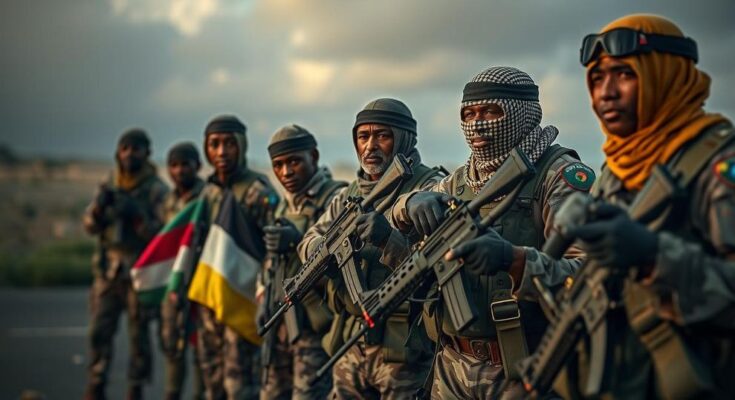Sudan’s ambassador to Tunisia, Ahmed Abdel Wahid Ahmed, condemned the influx of mercenaries from neighboring countries, stressing the need to halt this flow rather than seek military aid. He reported significant displacement due to the ongoing conflict with the RSF, criticized its actions, and rejected the need for international peacekeeping forces, calling for international condemnation of the RSF’s violations.
The Sudanese ambassador to Tunisia, Ahmed Abdel Wahid Ahmed, has voiced strong opposition to the influx of mercenaries from neighboring countries, particularly Libya, Chad, and Niger. In a press conference held in Tunis, the ambassador emphasized that Sudan does not require military aid but rather needs a cessation of the arrival of these foreign fighters. He stated that for every mercenary eliminated, thousands more arrive, underscoring the severity of the situation amidst an ongoing conflict between the Sudanese army and the Rapid Support Forces (RSF). The ambassador further highlighted the dire humanitarian crisis resulting from the clashes, noting that over 13 million Sudanese have been displaced, with 10 million forced to flee their homes within Sudan and approximately 3 million seeking refuge abroad. The violence has reportedly claimed around 5,000 lives in Khartoum alone. He criticized the RSF for their control of strategic areas like South Darfur, where they are alleged to have committed severe atrocities while also occupying residential properties in the capital and around Gezira State. Ambassador Ahmed denounced the actions of the RSF as morally and legally indefensible, urging the international community, particularly the United Nations, to condemn these acts of violence. He also expressed his rejection of international peacekeeping forces, insisting that the Sudanese army is capable of maintaining order within the country. Sudan’s representative to the United Nations, Al-Harith Idris, accused Libyan General Khalifa Haftar’s forces of providing military supplies to the RSF, exacerbating the conflict further.
The ongoing conflict in Sudan primarily involves the Sudanese army and the Rapid Support Forces (RSF), a paramilitary group with significant territorial control. The situation has been complicated by the presence of foreign mercenaries and military supplies from neighboring countries, contributing to instability. The humanitarian crisis resulting from this conflict has led to widespread displacement and violence, prompting urgent calls for action from Sudanese officials. The involvement of regional actors highlights the complexities of the crisis, making it a significant concern for international relations.
In summary, the Sudanese government, represented by Ambassador Ahmed Abdel Wahid Ahmed, is vehemently opposed to the influx of foreign mercenaries and the actions of the Rapid Support Forces amidst the ongoing conflict. With millions displaced and significant loss of life, the situation necessitates urgent international attention and condemnation. Sudan insists on its sovereignty and capability to manage internal security without external peacekeeping forces, while also calling for accountability from the international community regarding the actions taken by the RSF and external military support.
Original Source: libyaobserver.ly




